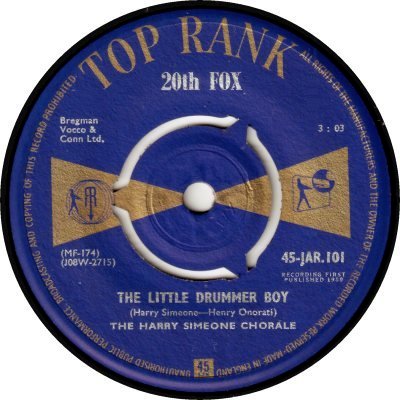
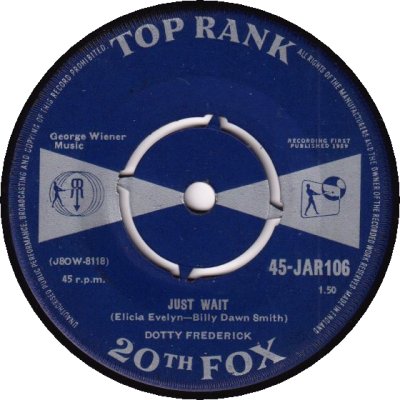
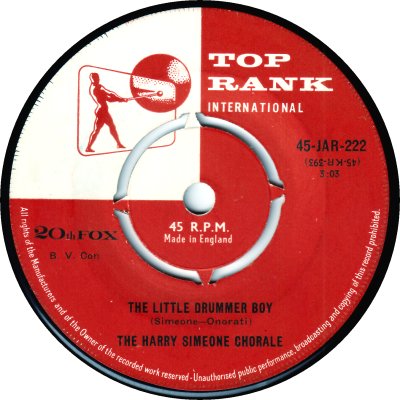
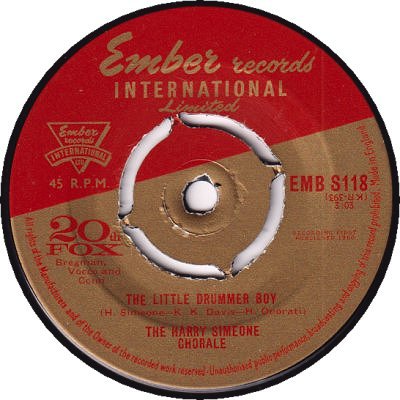
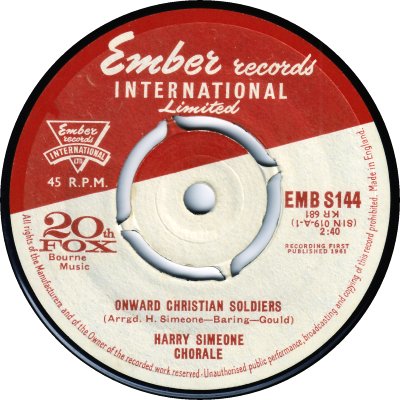
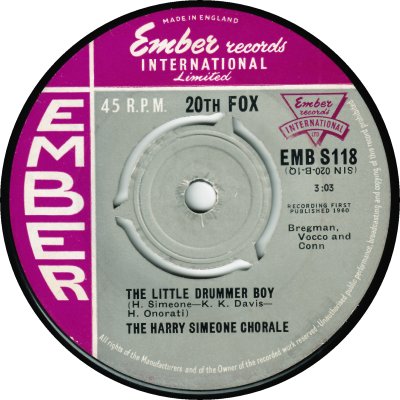
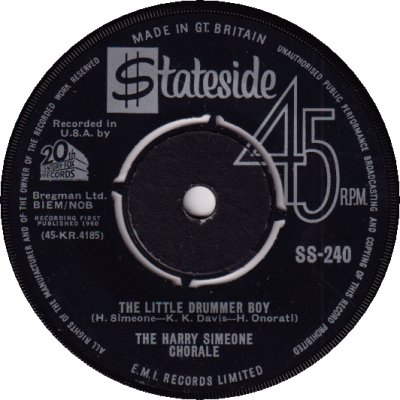
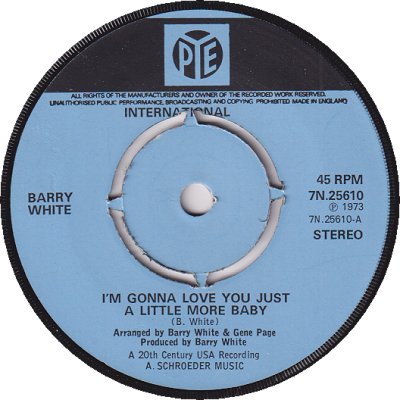
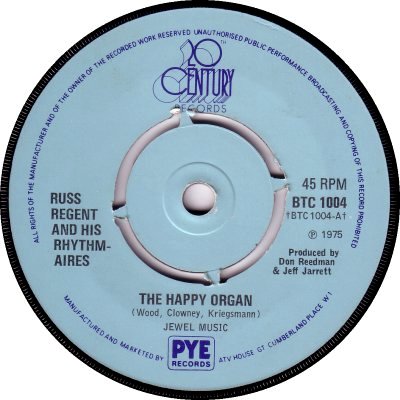
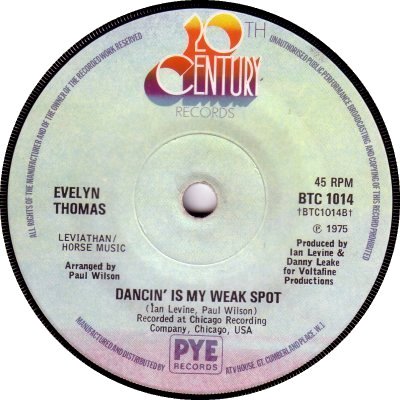
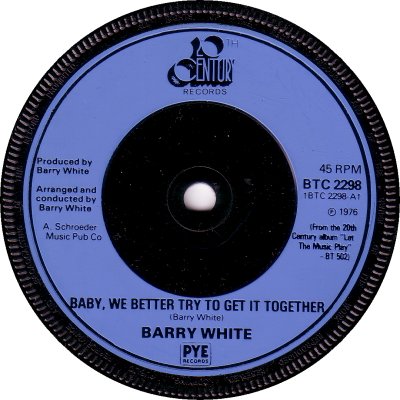
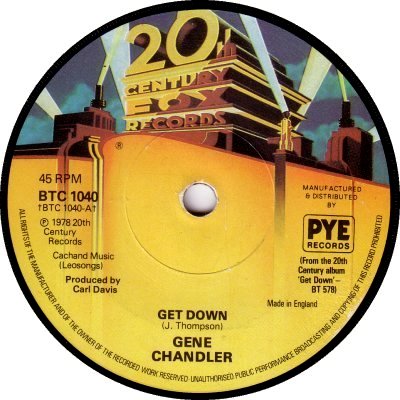
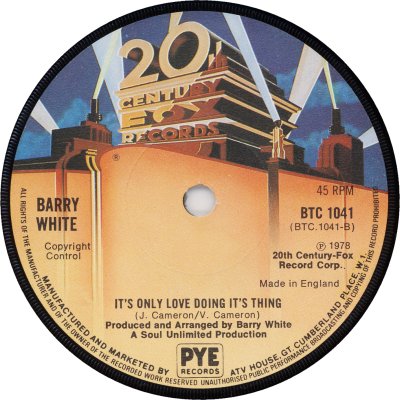
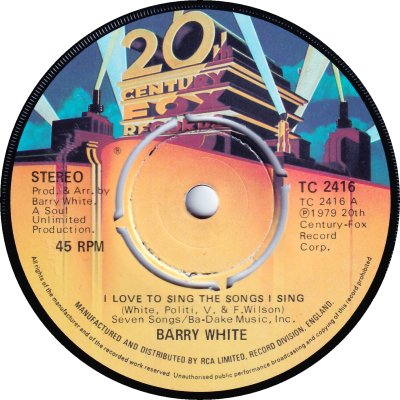
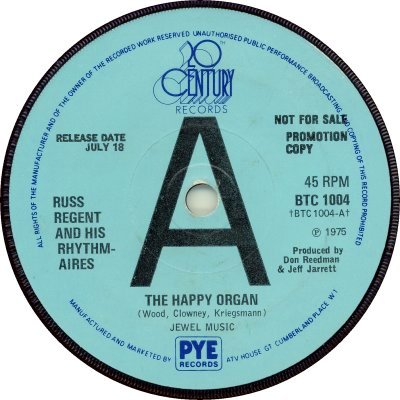
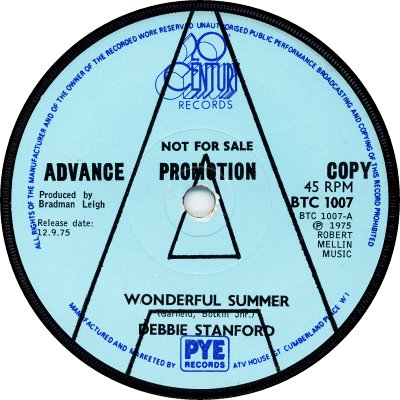
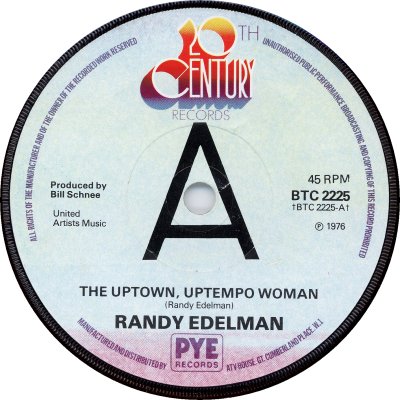
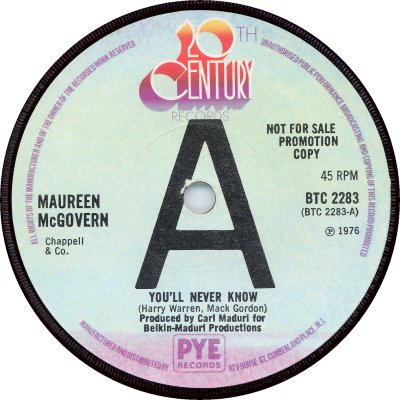
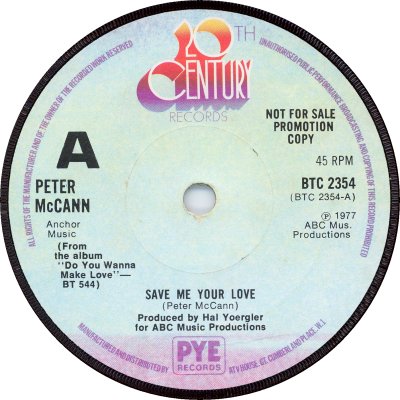
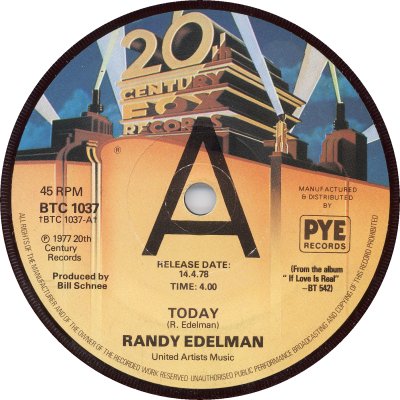
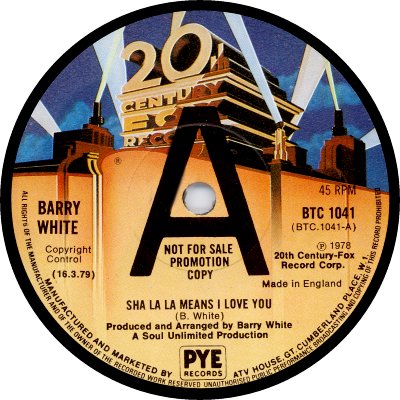

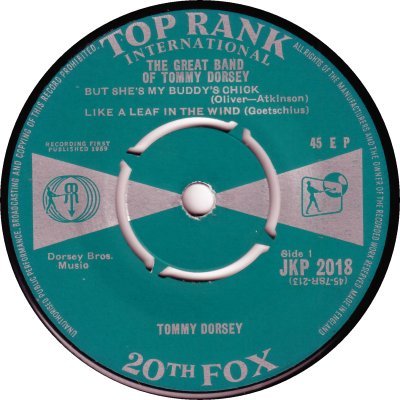
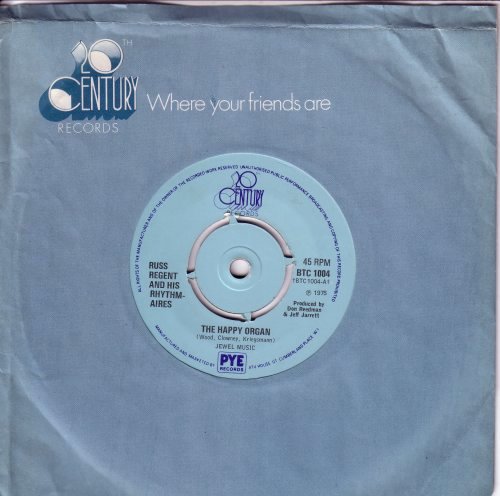
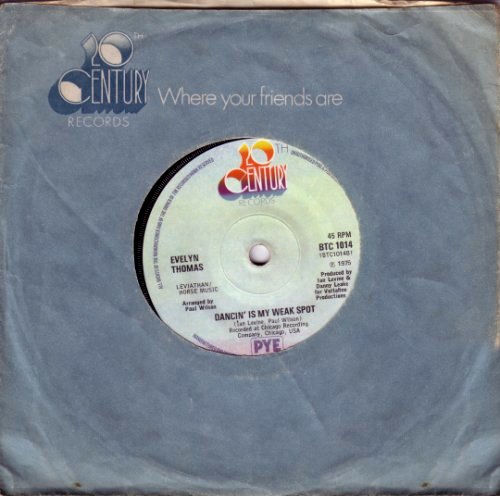
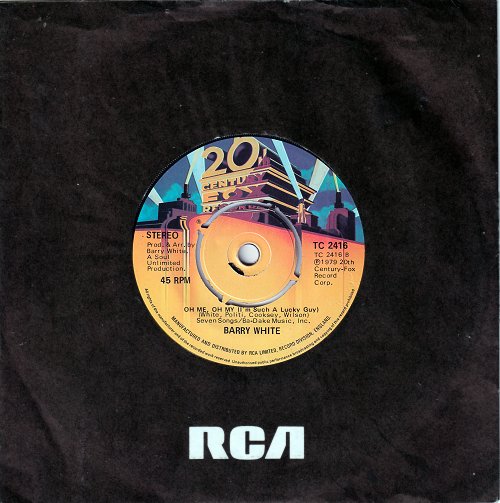
American. News that film giant 20th Century-Fox was going to enter the record business came in 'Billboard' of the 3rd of February 1958, courtesy of company president Spyrous Skouras. 'BB' of the 10th was able to say that a record company had been formed and that Henry Onorati , vice president of Dot Records (q.v.), was going to take the helm in March when his contract with Dot expired. It added that Skouras had considered buying an existing company but had decided to start one and add to it. It was intended that the new label would be active in all genres and would release albums and singles. A couple of months later 'BB' of the 21st of April reported that the label was set to put out its first two records, both of them singles. The plan was for forty to fifty singles per year, with a maximum of two per week, and discussions with the parent company about possible film tie-ups were taking place.
A review of the first single from the new label - called '20th Fox' - appeared in 'BB' of the 28th of April 1958, along with an observation that sixty-four masters had been offered to the company in the past four weeks; deals had been signed for six of them. A head of steam was building up: Onorati was able to announce in 'BB' of the 12th of May that distribution deals had been signed which would see 20th Fox product coming out in the principal countries of Europe along with Australia, New Zealand, South America and North Africa. The UK rights went to Top Rank, in an agreement which came into force on the 1st of January 1959. There was no reciprocal deal for Top Rank product to appear on 20th Fox ('BB', 15th December 1958). 'BB' of the 26th of May was able to state that 20th Fox was preparing to enter the album market, and that at least ten such discs were expected to be in the shops by August. The label hit paydirt with the Christmas hit 'The Little Drummer Boy' by The Harry Simeone Chorale; 'BB' of the 22nd of December reported that it had sold 400,000 copies. It proved to be a perennial favourite and was a hit in several different years. In the wake of Christmas 1960 it qualified for a gold record, and by the time 'BB' of the 21st of December 1968 came out sales of the various versions - of which there were any number - were expected to hit the 24 million mark.
'The Little Drummer Boy' proved to be 20th Fox's only hit of 1958, but it ended the year 'in the black' with gross receipts of $350,000 ('BB' 26th January 1959) - Henry Onorati was quoted as saying that the company was employing a 'blockbuster' technique, releasing few singles but concentrating on each of them. Despite the arrival of Al Martino in 1959 the number of hit singles failed to rise substantially, 'BB' of the 28th of December putting the figure at two. The following year saw the introduction of a 'Master Art' series for unusual and Classical music; the low-price label Studio Records, which featured reissues of old 20th Fox material, also made its debut ('BB', 7th March 1960). Another attempt to boost album sales came in the form of a 'Buy an LP, get its twin free' deal, which applied to nine albums including ones by best-selling artists Al Martino, the Harry Simeone Chorale and the 20th Century Singers ('BB', 1st August 1960). A setback came in the form of a lawsuit from Simeone, alleging 'unauthorized deductions' made from royalties for 'The Little Drummer Boy' and seeking punitive damages for alleged breach of contract. 'BB' of the 12th of September was able to comment that the company was living up to its promise to cover a wide range of genres, with its new releases including Jazz, Soundtracks, Children's and Classical albums. One name on 20th Fox that will be familiar to British punters was that of Rolf Harris, whose 'Tie Me Kangaroo Down Sport' came out in June 1960. That same year, Top Rank was bought by EMI in the UK, which led to 20th Fox moving to Ember Records here (q.v.).
In the summer of 1961 'BB' reported that there was to be a 'big push for action' in the singles market. New artists were to be signed, independent productions were to be sourced in addition to in-house ones, and a department for the production, scheduling, marketing and promotion of singles was being formed ('BB', 24th July). Despite this activity matters failed to improve much, and both Onorati and vice president Lou Del Guercio resigned in February 1962. 'BB' of the 10th, breaking the news, observed that substantial changes were in prospect at 20th Fox: a survey of the company was under way which would result in recommendations being made to executives. It was believed, however, that 20th Century-Fox would remain in the record business. Basil Bova was put in charge of record operations for the time being. 'BB' of the 7th of July quoted him as saying that a closer link between the company's recording, film and television activities was planned, with more albums and singles taken from soundtracks being issued and records being made by film and TV stars. A few months later talks took place with Bernie Lowe, head of Cameo Parkway, about the future of 20th Fox, but they eventually proved fruitless. 'BB' of the 18th of August, commenting on those discussions, observed that 20th Fox had never blossomed into the kind of going concern that its parent had hoped for, and added that since the departures of Onorati and Del Guercio its activities had been virtually at a standstill, pending the promised reorganization. A week later, in 'BB' of the 25th of August, Basil Bova denied that there was any intention to merge or sell 20th Fox, and said that its parent company was preparing an all-out campaign to build up the disc firm.
A measure of relief came in the spring of 1963 with the news that despite 'sky high' bids from other companies for the soundtrack of the yet-to-be-released 20th Century-Fox blockbuster film 'Cleopatra' the company was likely to put it out itself on 20th Fox to give the label a boost ('BB', 23rd March). Norm Weiser, previously an executive with United Artists, was appointed vice president in change of operations for 20th Fox, ending what 'BB' of the 27th of April described as 'year-long speculation about the label'. A spokesman for the parent company claimed that the signing was the first step in making 20th Fox an important record label. Then in the summer came a change of name, with 20th Fox Records taking on the name of its parent and becoming 20th Century-Fox. Towards the end of the year a new singles-only label, 'TCF' was introduced. According to 'BB' of the 23rd of November 1963 it was to feature 'unknown artists' and was to have a roster of around ten of them. By the middle of 1965 it had become an outlet for independent productions.
'BB' of the 4th of January 1964 reported Norm Weiser as saying that he believed that that year would be the label's biggest, but a mere four months or so later 'BB' of the 30th of May broke the news of his exit. In the meantime Dr. Martin Luther King had successfully sued 20th Century-Fox Records over the unauthorized use of material from his 'I Have A Dream' speech, which had been included in an album called ' The March On Washington' without his permission. Morty Kraft took over as 'creative director' in August; he had held similar positions at MGM and Mercury, and was to supervise all of the creative aspects of the label ('BB' 8th August). 'BB' of the 31st of October observed that while continuing to work closely with 20th Century-Fox films, Bernie Wayne, who had taken over the A&R aspect some weeks earlier, was opening the door to all-comers in an attempt to build up the label in other areas. The various efforts brought little reward, and in the autumn of 1965 'BB' broke the news that a major staff retrenchment was under way, after 20th Century-Fox had had one hit so far that year. 1967 provided a bright spot when the soundtrack to 'Dr. Doolittle' earned a gold record ('BB', 2nd September). Donald B. Dickstein was appointed administrative co-ordinator of the label towards the end of 1968; his duties included supervision of A&R, production and promotion, and liason with ABC, who were acting as its distributors by then.
There were no singles released in 1969, only nine in 1970 and a solitary one in 1971, though the occasional soundtrack album continued to surface. Inevitably there was renewed speculation about the future of 20th Century-Fox Records. 'BB' of the 23rd of January 1971 reported that there had been 'considerable discussions' about a merger between MGM and 20th Century-Fox Films, with the possibility of MGM Records - and by extension 20th Century-Fox Records - being sold off; DGG / Philips were said to be possible purchasers. As it turned out, instead of a sale there came an eventual rebirth.
In the summer of 1972 'BB' of the 17th of June carried the news that 20th Century-Fox Films were to launch a new label in the near future - the article added in passing that 'years ago' the company had been 'quite active' with 20th Century-Fox records. 'BB' of the 29th of July was able to give a planned launch date - the 15th of August - and to put a name to the label, '20th Century'. In effect, the article said, the label was a new one 'from stem to stern', and its logo was to have no reference to the link with the film company. Russ Regan had been appointed president of 20th Century, and it was intended to concentrate on contemporary Rock and Soul. 'BB' of the 27th of January 1973 gave some background on Regan: he had previously been with UNI Records, he had played a major part in breaking Elton John in the States, and his success in the past had been due in part to his turning out product that was aimed at more than one market. That same issue noted that under Regan 20th Century had started expanding into foreign markets, and had signed a distribution deal with Pye for the UK. Finally there was a report that can't have seemed all that significant at the time but which was to have a huge impact on the label's fortunes: it had signed writer / producer / singer Barry White. Not long after that another act was signed which was to enjoy a lot of success in the USA: the De Franco Family. A tie-up with magazine publishers the Laufer Entertainment Group guaranteed the De Francos a lot of exposure, with the aim of turning them into 'a new teen idol group' ('BB', 5th May 1973). The ploy was to pay off handsomely.
At last the hits started to flow, and the revamped 20th Century began to make a big impact on the Charts. Regan gave some insight into his methods in an interview with 'BB' of the 30th of June 1973 in which he stated that his hit formula for Soul was to aim records at the 'young girl' market because the girls would turn their boyfriends on to those records. He also said that he looked for a hooky melody and relatable lyrics; he listened to the sound of the rhythm first and then to the 'sweetening', insisting on a remix if the over-all effect was overpowering. Whatever his formula was, it worked. 'BB' of the 13th of October 1973 was able to report that 20th Century had scored three gold singles and a gold album in its first year of operation, Barry White contributing the album and one of the singles. Then, just before the end of the year, 'BB' of the 22nd of December added that the De Franco Family's single 'Heartbeat - It's A Lovebeat' had sold 175,000 copies, and that the band's album was expected to achieve gold status within the next couple of weeks.
'BB' of the 16th of February 1974, looking back, observed that Regan had practically started the label from scratch, with the support of 20th Century-Fox Films, and had hand-picked all of his own staff. 'BB' of the 27th of April commented that 20th Century had enjoyed hit records in several genres - Rock, MOR, Soul, Pop and Bubblegum - and, apparently not content with that, had launched a new Country music division. So impressive was progress that 'BB' of the 31st of August carried a special supplement devoted to the label, which pointed out that its first gold record, 'Love Jones' by The Brighter Side Of Darkness, had gone gold less than six months after the start of operations, and added that at that time four gold LPs, six gold singles and a solitary platinum single had been chalked up. Barry White was responsible for all of the albums and three of the singles, while the De Franco Family had supplied the platinum single. The supplement named Dave McAleer as general manager of 20th Century in the UK, so it must have established a separate presence here by then. It went on to say that the label was to get its own identity in the UK in the autumn, as the start of a drive towards greater European involvement - 20th Century records were currently appearing on Pye's 'Pye International' label.
Confirming the report in 'BB', 20th Century made its debut as an actual label in Britain in October 1974. 'BB' of the 5th of October said that the new deal was an extension of the original licensing agreement. Hopes were high, and a spokesman for the company observed that the first year-and-a-half that it had spent with Pye had been 'very successful'. Sure enough 20th Century scored an almost immediate Chart-topper in the form of Barry White's 'You're The First, The Last, My Everything'. The arrangement with Pye allowed for product to flow in the other direction, and 'Kung Fu Fighting' by Carl Douglas - a Pye single - gave 20th Century a No.1 in America, contributing to what 'BB' of the 14th of December called the company's '$2m month' of November; at that time it had three singles in the Hot 100 and four in the Soul charts.
There were more successes in 1975 and 1976, but storm clouds were gathering. Dave McAleer resigned as general manager of the UK office in September 1976, citing policy differences with Russ Regan ('Music Week', 4th October). The UK office was closed down a couple of months later, and administration of the label was handed over to Pye ('MW', 27th November). 'BB' of the 4th of December noted that 1976 had actually been the UK operation's most successful year to date, but that its parent in the USA had suffered 'heavy losses' during the previous nine months. That the financial situation was worrying was underlined by a comment from Harvey Cooper, then marketing executive of 20th Century Records, that October had been the largest business month in the company's history and that it might "rectify financially the sins of the past two years."
Perhaps as a result of the financial situation, Alan Livingston, vice president of the entertainment group of the 20th Century-Fox Corporation, took charge of 20th Century Records in early 1977. 'BB' of the 26th of February disclosed that the Record and Publishing divisions, combined, had made a loss of more than $4.5m last year, despite the Publishing division actually making money. The artist roster had been reduced and the label was making a comeback, it was claimed, but it was 'just starting' to do so. Barry White's records were still selling well but the company as a whole had been 'caught cold' last year. Russ Regan was still serving as the 'creative ears' of the company at the time, but a critical yearly report, summed up in 'BB' of the 9th of April, seems to have prompted his departure. According to that report, large quantities of several major albums had been pressed and distributed in late 1975 and early 1976 in anticipation of sales which failed to materialize, in addition to which there had been fewer LPs from the major artists and no new signings had been made to boost sales. Operating expenses were to be reduced to 'more realistic levels', and marketing was to be concentrated on a limited number of new artists. The article added that Regan had left on Friday the 1st and that Harvey Cooper, Jack Hakim (vice president of promotion) and Bill Donnelly (vice president of corporate finance) were to spearhead the label, as Livingston's other roles for the 20th Century-Fox corporation prevented him devoting his attention to the label full-time. Shortly afterwards, 'BB' of the 23rd of April revealed that Livingston had assumed the title of president of 20th Century Records, and that Cooper become senior vice president of A&R, taking on the A&R duties in addition to his current marketing and promotion ones.
Unsurprisingly a certain amount of rethinking took place following these developments. Cooper decided to concentrate on singles, and to curtail album activities until 'the marriage between artist, manager, producer and record company has proven correct'. The artist roster was to remain small, and any recording project would have to be put before a committee of 20th Century-Fox department heads before getting the go-ahead ('BB', 30th April 1977). One album which did get released was the soundtrack to 'Star Wars'; it provided some relief, and 'BB' of the 15th of October reported that its sales were approaching three million copies. Less welcome were reports that Barry White was to leave and to rejoin Russ Regan at Regan's new company, Parachute ('BB', 3rd December 1977). White didn't depart immediately, but in the summer of 1978 'BB' of the 5th of August broke the news that he and his 'Unlimited Gold' label had signed with CBS. By that time '20th Century' had gone back to being '20th Century-Fox', the change taking place in early spring. Cooper resigned in September, as did another vice president, Lenny Beer ('BB', 19th).
Early 1979 saw a distribution deal being signed with RCA ('BB', 13th January); the contract required 20th Century-Fox to bring its foreign licensees to RCA, a process which was carried out in Britain in April ('MW', 28th). That same month, Neil Portnow, previously with RCA, was made senior vice president of 20th Century-Fox Records. Portnow was able to steady the ship, to a certain extent. 'BB' of the 4th of October 1980 noted that he had begun to aim at the mid-price / budget label market and had been signing a number of performers who had formerly been successful but who had not been in the Charts of late; among their number were Gene Chandler, The Chi-Lites, The Impressions, The Dells, and Dusty Springfield. The intention was to provide these artists with good material and trust that a combination of that with name recognition would do the trick. The ploy bore some fruit, and resulted in returns to the Charts for several of the artists. Some new artists enjoyed successes too, notably Stephanie Mills; her 'Sweet Sensation' album went gold, as did several of her other records.
Despite these promising signs, the financial state of 20th Century-Fox Records remained a cause for concern. During the late 1970s and early 1980s protracted losses had been posted, that of 1978 being $12m. When Marvin Davis took over the parent film company - and by association the record company as well - in May 1981 there was speculation about the future of 20th Century-Fox Records, fuelled in part by staff cutbacks at the time of the change of ownership. 'BB' of the 22nd of August 1981 quoted Portnow as saying that reports of the label's demise had been greatly exaggerated: three of its acts currently had Chart hits, the roster had been maintained, and a strong line-up of releases was in place for the autumn. The financial losses had been halted, and he was confident that the label would return to profitability by the end of that year. He said that while of late 20th Century-Fox had been known for Barry White records and the Star Wars soundtrack it was now creating a company of viable artists; a number of careers had 'solidified' and others were on the way to doing so.
In the wake of a hopeful forecast such as that, it is perhaps unsurprising that the end of 20th Century-Fox Records was not a long way off. 'BB' of the 28th of November 1981 told its readers that both the record company and its publishing arm were up for sale separately, and that a deal was expected to be settled by the end of the year. RCA were currently involved in discussions about the purchase of the record side, while several companies were showing interest in the more valuable publishing operation. The negotiations lasted for longer than was expected, and 'BB' of the 23rd of January 1982 revealed that at that time Polygram and a company called Aroxov Records were bidding for the label. Polygram eventually won; 'BB' of the 10th of April was able to state that it had agreed to assume managerial and operational control of 20th Century-Fox Records, and that Portnow was moving on to join Arista Records. The article reckoned that the big attraction for Polygram was Stephanie Mills, who had registered a number of gold records in the recent past. The final mention of 20th Century-Fox Records in 'BB' came in the issue of the 24th of July, which said that Polygram was now the owner of its catalogue, and that - with the exception of records by Carl Carlton for a limited period - all future product by the label's stable of artists would be released on Polygram's 'Casablanca' label.
In Britain 20th Century-Fox material was licensed to a number of different labels including Top Rank, Ember, EMI and Pye. The late '50s and the 1960s were pretty barren as far as Chart hits were concerned, with only the Harry Simeone Chorale making any sort of an impression. Their recording of 'The Little Drummer Boy' b/w 'Die Lorelei' was a No.13 hit on Top Rank (JAR-101; 1/59); it made a reappearance as the 'B' side of 'Onward Christian Soldiers' on Ember, which was a Top 40 record in 1960 and 1961 (EMBS-118; 12/60 and 12/61). It was reissued several times by 20th Century-Fox's licensees and can be found on several different labels, as the scans above indicate. Apart from the Chorale, only Al Martino troubled the Chart compilers, spending one week at the No.49 spot with 'Summertime' b/w 'I Sold My Heart' (Top Rank International, JAR-312; 3/60).
Russ Regan's rejigged 20th Century label fared far better, in the 1970s. The jewel in its crown here, as in the USA, was Barry White, whose fourteen hits from 1973 to 1979 included six Top 20 entries. As stated above, the pick of them was 'You're The First, The Last, My Everything' b/w 'More Than Anything, You're My Everything' (BTC-2133; 11/74), which gave the company its sole No.1, though 'You See The Trouble With Me' b/w 'I'm So Blue And You Are Too' (BTC-2277; 2/76), did almost as well, reaching the No.2 position. Other hits came via Love Unlimited, the Love Unlimited Orchestra, Maureen McGovern, Randy Edelman (3), Dan Hill, Edwin Starr (2), Gene Chandler (3), Stephanie Mills (2) and Carl Carlton (1), but only the Love Unlimited Orchestra, Starr (twice) and Mills managed to crack the Top 10. 20th Century's UK division chipped in with a trio of hits that originated here, from The Exciters and Evelyn Thomas (2), but only Thomas's 'Weak Spot' b/w 'Dancin' Is My Weak Spot' (BTC-1014; 1/76) made it into the Top 30 - it peaked at No.26.
With regard to labels, 20th Fox product appeared on Top Rank from the start of January 1959 into the summer of 1960. The labels carried a prominent reference to 20th Fox (1, 2, 3, 23). Following the move to Ember in 1960 the company's records came out on the Ember label, again with 20th Fox receiving a fairly large credit, either in the form of its logo (4, 5) or latterly as text (6). After the move to EMI, in 1963, product was issued on the Stateside label, with the 20th Century-Fox logo added (7). That state of affairs lasted until the autumn of 1968, though there weren't all that many releases; those that did surface tended to be associated with films. When the revitalized company signed an agreement with Pye its products initially appeared on the Pye International label, starting in January 1973. 20th Century was given a production credit, but it was in fairly small print (8), as was the Pye custom. The actual 20th Century label first saw the light of day here in October 1974, as an extension of the deal with Pye. 20th Century stayed with Pye until the spring of 1979, but from October 1975 until November 1976 the arrangement appears to have been a pressing and distribution one, as mentioned in 'Music Week' of the 27th of November 1976, rather than a licensing one - that time covered part of the period during which the company's British office was in operation.
Four different 20th Century labels were used during the Pye years. The first, which was pale blue (9), changed to a kind of duck-egg blue and gained a more colourful logo (11) in October 1975. The wording at the bottom changed from 'Manufactured and Marketed by Pye' to 'Manufactured and Distributed by Pye' at the same time, presumably to reflect the change from licensed label to independent; the new wording continued to be used when Pye took over administration from 20th Century's defunct UK office. Some injection moulded labels (10) can be found; these were contract pressings, made by Phonodisc, presumably at a time when Pye's own presses were fully occupied. The duck-egg blue design lasted until April 1978, when it was replaced by a more ambitious yellow one, in which the company's name was given as '20th Century-Fox'. The artist credits started out at 9 o'clock (12) and switched to 6 o'clock in August 1976 (13) but occasional 6 o'clocks can be found during the 9 o'clock period and vice versa. After the switch to RCA the label design stayed basically the same, but the Pye logo disappeared and the manufacturing and distribution credits changed accordingly (14). One company sleeve served throughout the Pye era (24, 25); it continued to be used after the change of name to 20th Century Fox. After the move to RCA, RCA sleeves were used (26).
As far as demo labels are concerned, they were merely issue labels overprinted. Initially the overprinting consisted of a large solid central 'A' accompanied by the release date and the appropriate text (15); this was replaced by a hollow 'A' and larger text (16) for approximately two months, August to September 1975. The advent of the duck-egg blue label in October 1975 saw the solid 'A' making a return; the 'A' varied in size, and could appear with or without the text. Medium-sized 'A's tended to lack it (17), while bulkier 'A's tended to have it (18). A couple of singles from November 1977, BTC-2354 and 2357, had small 'A's at 10 o'clock (19), but the larger central 'A's returned at the start of 1978. With the coming of the yellow 20th Century-Fox label the central 'A's were retained; their sizes continued to vary, but the release date was now placed under the letter's cross-bar (20). Demo copies of the final two singles, BTC-1041 and 1042, had the date at 8 o'clock and the words 'Not for sale promotion copy' under the cross-bar (21). RCA-era promos had a smaller, hollow, central 'A' after the usual RCA fashion (22).
Pye-era singles appeared in two different, roughly concurrent, numerical series : a BTC-2000 one, starting in 1974, and a BTC-1000 one, starting in May 1975. The '2000' numbers were the same as those of the the American issues, but the American prefix was 'TC' rather than 'BTC'; in addition, the dates of issue in the different countries sometimes varied. The BTC-1000s appear to have been specific to Britain, though the material on them was often not British in origin. Numbering during the RCA period was identical to that of the American issues, in a TC-2400 series. As mentioned above, a certain amount of British material appeared on 20th Century in America, some of it not obvious - Judge Dread's rude Reggae singles 'Big Six' and 'Big Seven' came out on the label in 1973; The Goodies' novelty 'Funky Gibbon' followed a couple of years later and reached No.79 in the Hot 100. Other UK artists to have records on 20th Century included String Driven Thing, Jigsaw, and the Alan Parsons Project.


Copyright 2006 Robert Lyons.

